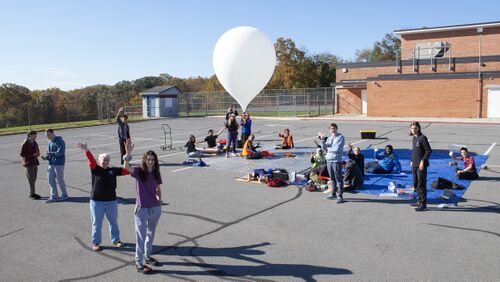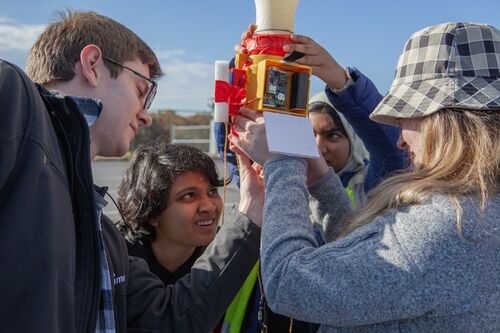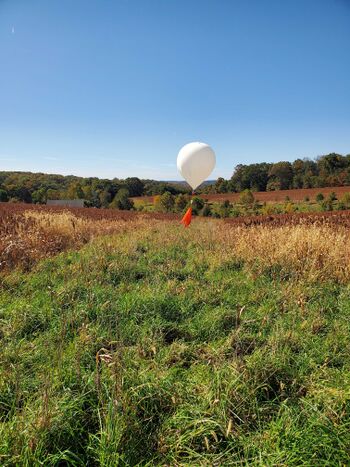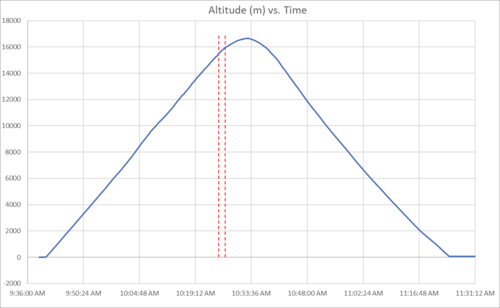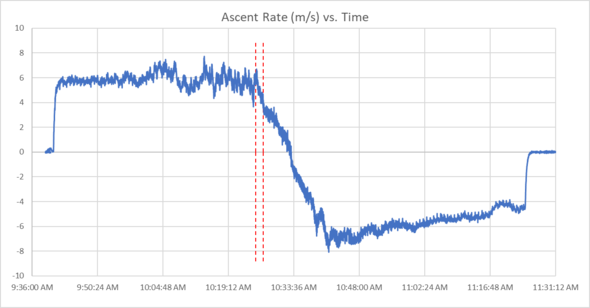NS-112: Difference between revisions
No edit summary |
(→Plots) |
||
| (8 intermediate revisions by 2 users not shown) | |||
| Line 2: | Line 2: | ||
|launchNumber = 112 | |launchNumber = 112 | ||
|date = 10/16/22 | |date = 10/16/22 | ||
|maxAlt = | |maxAlt = 17708,58100 | ||
|launchLoc = | |launchLoc = 39.6968,-78.1957 | ||
|landingLoc = | |landingLoc = 39.6577,-76.7251 | ||
|flightDuration = | |flightDuration = 01:36:00 | ||
|payloadList = </div> | |payloadList = </div> | ||
* [[Command-v5]] | * [[Command-v5]] | ||
| Line 13: | Line 13: | ||
N/A | N/A | ||
}} | }} | ||
== Launch Recap == | |||
[[File:NS-112 Launch Pad.jpg|Launch team on pad at NS-112|500px]] | |||
This was the first test flight of the balloon venting payload GHOUL (a spiritual successor to Helios). Since it was an unflown balloon neck payload there were some issues on the launchpad caused by GHOUL. The payload was not able to seal the neck of the balloon very well and a lot of leaking occurred. The leaks were patched with tape and this proved to be effective. However, adding the tape made it unlikely that the cutdown mechanism would work (eventually confirmed with post-flight ground testing) and the GHOUL team thought that the manual choppys installed below GHOUL would have to be used to terminate the flight, resulting in a loss of the payload. There was also an issue with the mechanism that was used to open and close GHOUL's vent. The rod that connected the vent to its servo became dislodged from its mounting point causing the vent to be unable to close once opened. This issue was recognized but the root cause was not diagnosed on the launch pad because the mechanism was inside of GHOUL and could not be accessed without disconnecting GHOUL from an already inflated balloon. Both of these issues made the launch team very pessimistic about the chances of success for this launch. | This was the first test flight of the balloon venting payload GHOUL (a spiritual successor to Helios). Since it was an unflown balloon neck payload there were some issues on the launchpad caused by GHOUL. The payload was not able to seal the neck of the balloon very well and a lot of leaking occurred. The leaks were patched with tape and this proved to be effective. However, adding the tape made it unlikely that the cutdown mechanism would work (eventually confirmed with post-flight ground testing) and the GHOUL team thought that the manual choppys installed below GHOUL would have to be used to terminate the flight, resulting in a loss of the payload. There was also an issue with the mechanism that was used to open and close GHOUL's vent. The rod that connected the vent to its servo became dislodged from its mounting point causing the vent to be unable to close once opened. This issue was recognized but the root cause was not diagnosed on the launch pad because the mechanism was inside of GHOUL and could not be accessed without disconnecting GHOUL from an already inflated balloon. Both of these issues made the launch team very pessimistic about the chances of success for this launch. | ||
[[File:GHOUL Troubleshooting.jpg|GHOUL team investigating the vent's mechanical issue on the launch pad|500px]] | |||
After release the balloon's ascent rate was very steady, indicating that there were no leaks coming from GHOUL. GHOUL was programmed to vent at 15km to lower its ascent rate by 40% and then vent again at 23km to lower its ascent rate to 0 m/s. When the balloon reached 15km, GHOUL successfully opened its vent and its ascent rate decreased from ~6 m/s to 3.6 m/s in 2 minutes. When GHOUL recognized it had successfully decreased its ascent rate, it tried to close its vent, but was unable to due to the mechanical failure that occurred on the launch pad. GHOUL continued to vent helium and decrease its ascent rate until the balloon was descending at ~7 m/s. Seeing this negative ascent rate, the launch team assumed that the balloon had burst or had been cut away. Although the flight did not last as long as originally planned, the GHOUL team was happy that they were likely going to be able to recover their payload and analyze what happened. | After release the balloon's ascent rate was very steady, indicating that there were no leaks coming from GHOUL. GHOUL was programmed to vent at 15km to lower its ascent rate by 40% and then vent again at 23km to lower its ascent rate to 0 m/s. When the balloon reached 15km, GHOUL successfully opened its vent and its ascent rate decreased from ~6 m/s to 3.6 m/s in 2 minutes. When GHOUL recognized it had successfully decreased its ascent rate, it tried to close its vent, but was unable to due to the mechanical failure that occurred on the launch pad. GHOUL continued to vent helium and decrease its ascent rate until the balloon was descending at ~7 m/s. Seeing this negative ascent rate, the launch team assumed that the balloon had burst or had been cut away. Although the flight did not last as long as originally planned, the GHOUL team was happy that they were likely going to be able to recover their payload and analyze what happened. | ||
The team was shocked when it reached the recovery site to find still intact and partially inflated balloon sitting in a field with all of the payloads attached. | The team was shocked when it reached the recovery site to find still intact and partially inflated balloon sitting in a field with all of the payloads attached. | ||
[[File:NS-112 Recovery.jpg|NS-112 recovery|350px]] | |||
This is the first time in BPP history that BPP has recovered a fully intact balloon after a (non-insignificant) flight. This may also be a first for the ballooning community at large. | This is the first time in BPP history that BPP has recovered a fully intact balloon after a (non-insignificant) flight. This may also be a first for the ballooning community at large. | ||
== Plots == | |||
[[File:Altitude vs. Time for NS-112.png | [[File:Altitude vs. Time for NS-112.png|Plot of Altitude vs. Time for NS-112|500px]] [[File:image (9).png|Plot of Ascent Rate vs. Time for NS-112|590px]] | ||
[[File: | |||
*zone indicated by red dotted lines shows when the GHOUL vent was commanded to open | |||
Latest revision as of 19:19, 13 December 2022
| Date | 10/16/22 |
| Maximum Altitude (m/ft) | 17708,58100 |
| Launch Location | 39.6968,-78.1957 |
| Landing Location | 39.6577,-76.7251 |
| Flight Duration | 01:36:00 |
| Payloads | |
| External Orgs |
N/A |
Launch Recap
This was the first test flight of the balloon venting payload GHOUL (a spiritual successor to Helios). Since it was an unflown balloon neck payload there were some issues on the launchpad caused by GHOUL. The payload was not able to seal the neck of the balloon very well and a lot of leaking occurred. The leaks were patched with tape and this proved to be effective. However, adding the tape made it unlikely that the cutdown mechanism would work (eventually confirmed with post-flight ground testing) and the GHOUL team thought that the manual choppys installed below GHOUL would have to be used to terminate the flight, resulting in a loss of the payload. There was also an issue with the mechanism that was used to open and close GHOUL's vent. The rod that connected the vent to its servo became dislodged from its mounting point causing the vent to be unable to close once opened. This issue was recognized but the root cause was not diagnosed on the launch pad because the mechanism was inside of GHOUL and could not be accessed without disconnecting GHOUL from an already inflated balloon. Both of these issues made the launch team very pessimistic about the chances of success for this launch.
After release the balloon's ascent rate was very steady, indicating that there were no leaks coming from GHOUL. GHOUL was programmed to vent at 15km to lower its ascent rate by 40% and then vent again at 23km to lower its ascent rate to 0 m/s. When the balloon reached 15km, GHOUL successfully opened its vent and its ascent rate decreased from ~6 m/s to 3.6 m/s in 2 minutes. When GHOUL recognized it had successfully decreased its ascent rate, it tried to close its vent, but was unable to due to the mechanical failure that occurred on the launch pad. GHOUL continued to vent helium and decrease its ascent rate until the balloon was descending at ~7 m/s. Seeing this negative ascent rate, the launch team assumed that the balloon had burst or had been cut away. Although the flight did not last as long as originally planned, the GHOUL team was happy that they were likely going to be able to recover their payload and analyze what happened.
The team was shocked when it reached the recovery site to find still intact and partially inflated balloon sitting in a field with all of the payloads attached.
This is the first time in BPP history that BPP has recovered a fully intact balloon after a (non-insignificant) flight. This may also be a first for the ballooning community at large.
Plots
- zone indicated by red dotted lines shows when the GHOUL vent was commanded to open
